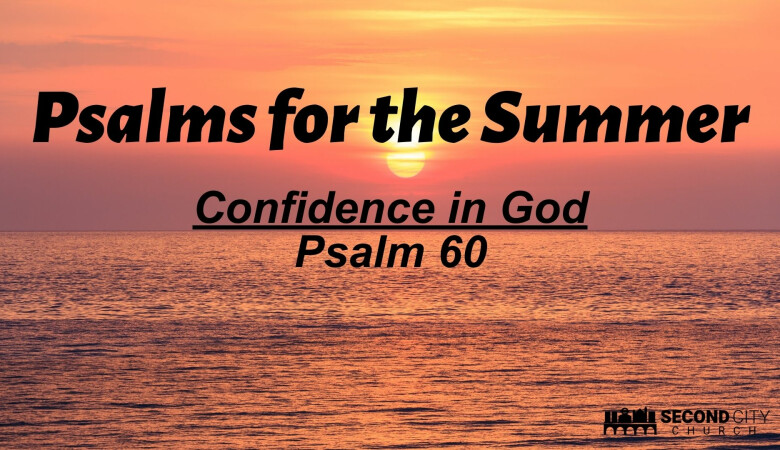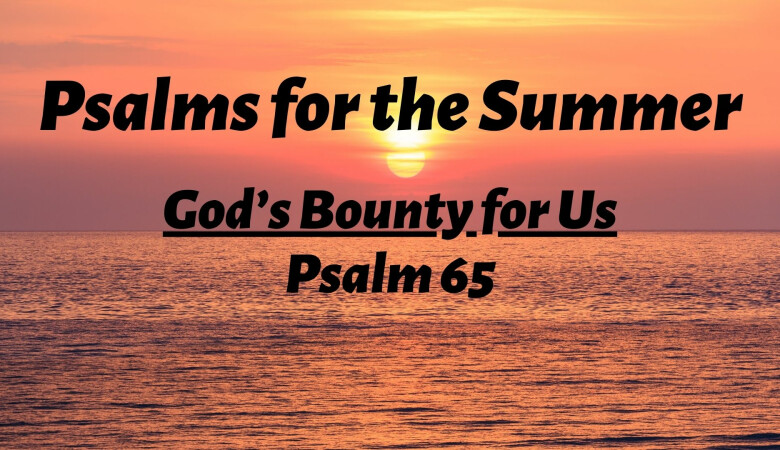Series: Psalms for the Summer
Trust Amid Tyrants
June 25, 2023 | Peter Rowan
Passage: Psalms 58:1-11
Summary
Enemies are all over the Bible and they are all over the Psalms. The Psalms take life seriously - there's no tidying it up! - and so they take enemies seriously. It seems, as Walter Bruggeman says, that "the Psalms are full of enemy talk." There are 94 terms in the Psalms to describe enemies! Friends can have become enemies, our own selves are at times our enemies, leaders can be enemies, and all kinds of others are enemies. Here in Psalm 58 the leaders, the ones who rule, the ones who are in some respects like God, are the enemies. They have used their power for their own self-serving end, they have abused those under them. And David sings about the desire for their destruction. He doesn't take vengeance, but he lays it before the Lord and asks him to deal with it. One of the great acts of faith, of trust, is the act to not seek vengeance but to believe that God will judge. This psalm ends with intense sobering language, but it is also comforting language. It is language that allows God to be judge, God to rule, God to execute justice rather than that ourselves. The psalms never gloss over the really difficult and painful dynamics of this life, and neither should we, but we also must live a life of faith, faith in God who will judge the living and the dead.
Transcript:
We are in Psalm 58 today together.
I want to begin this psalm by saying that someone asked me this week why I became a pastor. I’m not exactly sure why I responded this way, but maybe because I was studying this psalm, I was taken back to middle school and high school. I said that I remember really clearly thinking that even if I wasn’t a Christian I would want to study the Bible. It’s wildly interesting and covers so many topics and so many genres. But one of the aspects of the Bible that has always stuck out to me is the fact that it’s so real. I mean, it speaks to this life. And it doesn’t gloss over the mess. It doesn’t make life out to be some experience of constantly wearing rose colored glasses and singing “walking on sunshine” and “good good good good vibrations.” While it doesn’t gloss over the mess, it also doesn’t allow you to dismiss the beauty. Every single person is made in the image of God. There is loveliness, there is glory, there is resplendent majesty at times in this world. You can’t brush it all off and and throw it all away.
And the psalms, well, the psalms give voice to these soaringly high and deeply low emotions. They gives voice to the glory, but also to the anger. They are songs full of Alleluias and also they are battle cry’s for justice! And so, there are Psalms that we are told were sung to the tune “Doe of the Dawn” and “Lillies”, but also these psalms, 57, 58 and 59 are set to “Do Not Destroy!” These are raw psalms. The Bible is full of “honest-to-God” language. David has been fleeing. He has fled time and again. Fled from Saul, fled from Saul’s leaders, fled from people who he thought would help him. He’s fled from people in places of power, he’s fled from people who were supposed to rule and to rule with justice and with love for the people under their care. He has fled from people that were to be imitators of God. God, of course, is the great ruler, and those who rule on the earth are to be like little gods, little images of God. They are to pursue the well-being of their people. They are to give their ability of the sake of others. They are to extend in love. They are to rule with justice and righteousness.
On April 4, 1991, Chuck Colson gave an address at the Harvard Business School. Not long before HBS had established a Chair on Ethics because they were recognizing moral decline in American leaders as a significant problem. When they established that chair, Colson had written that their commitment to philosophical relativism had precluded the teaching of ethics. But they invited him and he came. He’s some of what he said:
[I]t’s awfully hard not to watch what is happening on the political scene without a certain sense of dismay. Look at the Keating Five-five United States senators, tried, in effect, by their own tribunal. Just before that, Senator Dave Durenberger, who happens to be a good friend of mine, was censured by the Senate. I also spent some time with Marion Barry, the former mayor of the District of Columbia , who was arrested for drug use. And in South Carolina and Arizona , scams in the legislatures have been exposed by federal prosecutors. I saw a press release in which the Department of Justice boasted that last year they had prosecuted and convicted 1,150 public officials, the highest number in the history of the republic. They were boasting about it, yet I read it with a certain sadness because it seems that kind of corruption has become epidemic in American politics. We have seen congressmen, one after another: Coehlo, Wright, Frank, Lukens-both sides of the aisle-either being censured or forced out of office. We see probably the most cynical scandal of all-the HUD scandal-where people were ripping off money from the public treasury that was designed to help the poor. Then, we’ve seen more spy scandals during the past five years than in all previous 195 years of American history combined-people selling their national honor for sexual favors or for money. Business is not immune. The savings and loan scandals are bad enough on the face of them, but the fact that they’re so widespread has fostered almost a looter’s mentality. Ivan Boeskky, speaking at UCLA Business School five years ago, said, “Greed is a good thing,” and ended up spending three years in a federal prison. Just last week one of the major pharmaceutical firms was fined $10 million for covering up violations of criminal statutes. It affects athletics. If you picked up a newspaper this week, you saw that Sugar Ray Leonard has just admitted to drug use. He’s been a role model for lots of kids on the street. Pete Rose spent time in prison for gambling. Academia has been affected. Stanford University ’s President Kennedy was charged with spending $7,000 to buy a pair of sheets-they must be awfully nice bed linens-and charging them improperly to a government contract. One day a Nobel Prize winner was exposed for presenting a fraudulent paper, and the very next day a professor at Georgetown University was charged with filing a fraudulent application for a grant from the National Institutes of Health. Probably saddest of all, at least from my perspective, are cases of certain religious leaders like Jimmy Swaggart and Jim Bakker. Bakker-whom I’ve also visited in prison-was prosecuted for violating what should be the most sacred trust of all: to speak for God and to minister to people in their spiritual needs.
It may be in vogue to think that you do what is right for you, but we all cringe at this list of leaders who have abused their positions of power for their own gain!
Just Friday a physician in Wilmington, NC was fined $170,000 because he has continued to prescribe an opioid to a single mother of four children! He’s a family doctor and for his own gain has been damaging families! Doctors take an oath to, first, do no harm.
Think of the recent pharmaceutical settlements. IN 2022 Johnson and Johnson, AmerisourceBergen, Cardinal Health and McKesson paid $26 billion dollars in settlement regarding the opioid crises. The Sackler family, or their company Purdue Pharma, was protected from lawsuits because their settled for 6 billion!
Just this week I watched some of the new documentary on Netflix about Hillsong Church and the extent of coverup by the Assemblies of God and Hillsong in Australia of Frank Houston is appalling. A supposed leader, a man of God, a pastor, who time and again abused children and yet there was no repercussions or accountability from the church, but rather he was praised and put in greater places of leadership and power.
Last year the Southern Baptist Convention lost over half a million members, by far the most they have ever lost in a year. Why? Because it has come out that there was widespread coverup of abuse scandals by leaders!
We assume now that many many politicians are in it for themselves. We have seen again and again how many church leaders have abused their power for their own pockets or to satiate their owns lusts.
Why do I go in to all of this?
Why? Because I know that when you heard this psalm you likely cringed. And I get it. It’s kind of wild to read the Bible and to read these words:
10 The righteous will rejoice when he sees the vengeance;
he will bathe his feet in the blood of the wicked.
Here’s the thing: you gain nothing, nothing at all, by denying the real nature of your experiences. Nothing. “Fear, hurt, anger, and the desire for revenge are elements of our lives as human beings.” And we have to be confronted with our full humanity and the true nature of the world. And beyond this, we can’t pretend that spirituality and life with God is best lived outside of these realities in this world! You gain nothing from that kind of vapid spirituality. Nothing.
You are right to have your blood boil with anger when you learn that a church has covered up time and again a leader who prayed after young children. You are right to have have sweaty palm and clenched fists when you think of how the very institutions that are to care for the poor are having their coffers plundered by the wealthy! You are right for your jaws to tighten and your teeth to grind when you hear of companies who are to be in the business of alleviating pain and promoting well-being yet continue to be found out as those who are promulgating the very drugs that kill and destroy family after family and community after community.
Listen:
1 Do you indeed decree what is right, you gods?
Do you judge the children of man uprightly?
2 No, in your hearts you devise wrongs;
your hands deal out violence on earth.
We aren’t totally sure how best to translate the word “ELEM” here that is translated “gods”. If you have a different Bible translation in front of you, you may see that it is translated “rulers” or “judges”. The word is at least related to the word for gods and the function that these leaders have, the rulers have, these judges have are god-like. They are to represent God. And yet, David said, they don’t decree what is right and they don’t judge uprightly. In fact, their devise wrong and they deal out violence.
If we continue on, what we learn is that through their life they lie (verse 3), they kill (verse 4 - they deal out venom), they don’t listen to correction (v. 5 they stop their ears).
So, what is your response to that? What is your response?
Well, I would suggest that there are three major options.
You bury it.
Part of the problem in our modern world is that we know too much. We have such easy access to information that we hear too often about the abuse of power. It’s too much before our eyes that it is just another headline to flip past and bury in our constant newsfeeds.
Or, it hits us so much and we feel so helpless that we bury it with activity, seeking to just forget it all. Or we feel so helpless and despairing that we bury it with substance abuse. It’s just too much.
You deal out violence yourself.
I don’t know how you can possibly hear of the violence of this world and not become intensely angry. And that angry must go somewhere. Where it often goes is to vengeance. We hear Jesus tell us to love our enemies and to do good to those who hate us and to bless those who curse us, but it is just too much and something needs to be done and you deal out violence yourself. And we hear Paul tell us to not repay evil for evil but we wonder if he was living under a rock!
You Trust God in the Midst of these Tyrants
Miroslav Volf teaches theology at Yale and is the Director of the Yale Center for Faith and Culture. He’s Croatians and had personal experiences with the ethnic cleansing and genocide in former Yugoslavia.
My thesis is that the practice of non-violence requires a belief in divine vengeance…My thesis will be unpopular with man in the West…But imagine speaking to people (as I have) whose cities and villages have been first plundered, then burned, and leveled to the ground, whose daughters and sisters have been raped, whose fathers and brothers have had their throats slit…Your point to them–we should not retaliate? Why not? I say–the only means of prohibiting violence by us is to insist that violence is only legitimate when it comes from God…Violence thrives today, secretly nourished by the belief that God refuses to take the sword…It takes the quiet of a suburb for the birth of the thesis that human nonviolence is a result of a God who refuses to judge. In a scorched land–soaked in the blood of the innocent, the idea will invariably die, like other pleasant captivities of the liberal mind…if God were NOT angry at injustice and deception and did NOT make a final end of violence, that God would not be worthy of our worship.
There are 40 imperative petitions in the psalms wishing for the destruction of an enemy. And I would bet that for most of us, we cring when we read them. But these calls are a great act of faith. They are not allowing the abuse of power and the violence of this world to just be brushed off as nothing, they are not allowing us to bury the abuse of power, they are not allowing us to meet the abuse of power with our own violence. No, they are a great act of trust, maybe one of the greatest acts of faith. They are saying, “God this is up to you!”
They are saying “God, we want the violent teeth of these lions broken! God, we want them to fade away like water and snail’s slime. God, we want such leaders to not ever exist like the sad sad state of a stillborn child. God, we want you to do this quickly!’
Now, I want to end this sermon and I want to tell you how Jesus didn’t retaliate against the violence put upon him but trusted himself to the Father, but I must mention that this is a psalm of David and that David was a leader. David was a leader who abused power. He brought death upon another and he did it for his sexual lust. He broke up a family for his own pleasure. And each one of us has been given power to different extents. And I would bet, given the state of our hearts that each one of us has abused the power we have been given at times. Maybe you think it is just categorically wrong to equate your abuse of your power with Purdue Pharma and Jeffrey Epstein and Frank Houston and Jim Baker and all of the rest. But just as God will bring about justice against the wicked, he will also bring peace for the righteous. And it’s not because the righteous are all so good. It’s not. It really is because Jesus is the only one who was perfectly righteous and yet did not lash out and call the angels of heaven to his aid, but submitted himself to take on the violence of sin and satan and death on the cross and show that the powers of sin have no lasting power against the righteousness of GOD. That is your only hope. That was David’s only hope, that is my only hope.
Brothers and sisters, feel the anger at the abuse of power in our world. And if you are tempted to think that the real spiritual life with God is devoid of such feelings, read these psalms again and again. But as you feel that anger, don’t bury it and don’t live it either. Don’t let it control you. Don’t let it live its life out in you. Give it to the Lord. He says again and again "vengeance is mine!" "Vengeance is mine!" He will repay.
I can only leave you with a very simple message, as someone who had thought he had it all together and attained a position of great power. I never thought I’d be one of the half-dozen men sitting around the desk of the president of the United States , with all of that power and influence. I discovered that there was no restraint on the evil in me. In my self-righteousness, I was never more dangerous. I discovered what Solzhenitsyn wrote so brilliantly from a prison-that the line between good and evil passes not between principalities and powers, but it oscillates within the human heart. Even the most rational approach to ethics is defenseless if there isn’t the will to do what is right. On my own-and I can only speak for myself-I do not have that will. That which I want to do, I do not do; that which I do, I do not want to do. It’s only when I can turn to the One whom we celebrate at Easter-the One who was raised from the dead-that I can find the will to do what is right.
Series Information

Every summer Peter and an occasional guest speaker take us through the Psalms. Of the Psalms Luther said " the Psalter is a book of all the saints, and everyone, whatever his situation may be, finds psalms and words in it that fit his situation and apply to his case so exactly that it seems they were put in this way only for his sake..."









